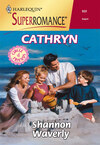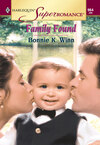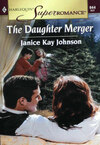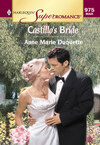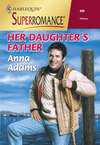Kitabı oku: «Cathryn», sayfa 2
Well, he was tired of it. It was clearly time to focus. Or at least do something about one or the other.
Tucker dropped his third cigarette into the trash receptacle and headed inside. Old man D’Autell was sitting in his office at the end of the center hall, changing a tape for the P.A. system. More harp diddling. Leaning in the doorway, Tucker asked, “Is there a phone somewhere in this building where I can make a private call?”
The long-faced mortician gazed at him with a wariness that slightly offended Tucker. As far as he could remember, D’Autell had never been the target of any of his boyhood pranks.
“Will it be long distance?”
“Yeah, but I’ll use my calling card.”
D’Autell cranked himself out of his chair, giving the phone a slight push in Tucker’s direction.
“Thanks,” he said as the old man walked by.
In place of “You’re welcome,” D’Autell grumbled, “Don’t touch anything.”
Tucker closed the door, went to the phone and punched in a Missouri number. Jenny answered on the third ring.
Hearing her voice, Tucker tried to summon up an image of the woman who was carrying his child and was disturbed when he couldn’t. He could see short auburn curls and grass-green eyes and a pointy chin. And freckles. Yes, there were definitely some freckles. But he wasn’t able to put all the parts together and see a cohesive whole.
“Hey, Jen,” he began, sitting down in the chair D’Autell had vacated. “It’s me, Tuck.”
“Oh.” Her voice sank, leaving no question how she felt about hearing from him.
“How’s it going, darlin’?”
“How’s it going? I just spent the morning puking my brains out. That’s how it’s going.”
“Oh, I’m sorry.”
“Yeah, well, you should be.”
“Sorry,” he mumbled again, wincing.
“So what do you want, Tuck?” Somehow she managed to sound both bored and impatient.
“Just to talk.”
She sighed heavily. He tried not to take offense.
“Are you coming over?” she asked. “Are you back in town?”
“No. No to both questions. I’m in Massachusetts. I had to fly home because of a death in the family.”
“Home?” Her surprise underscored how little they knew about each other. “You’re from Massachusetts?”
“Sort of. I was born in New York, but…” He felt himself closing the gates of communication. But if he and Jenny were meant to live the rest of their lives together, it was time to start sharing. “When I was thirteen, I came here to live with my grandfather’s brother Walter and his wife Winnie. Walter just passed away.”
“Oh.” Jenny’s uncertain exclamation betrayed an encouraging softening. “That’s too bad, Tuck.”
“Yeah, it is. He was a great old guy. Played a mean hand of whist.”
“What happened to your parents?”
He swallowed, faced with the question he’d had to answer all his life. “My father died in Vietnam when I was three, and when I was twelve my mother…was the victim of a drunk driving accident.”
“She died, too?”
Jenny was astounded and incredulous. As well she should be, he thought. It was an astounding, incredible story. A lie, actually. Not the part about his father dying in Nam; Tuck had worn the Silver Star posthumously bestowed on his father right until the day the clasp broke off. The part about his mother was a lie. He’d chickened out again. He couldn’t admit his mother had been sent to prison when he was twelve and had overdosed five years later.
“Anyway, I’m at the wake now, taking a break, and I had to call. You’ve been on my mind since last weekend.”
“Where in Massachusetts?” she asked, steering so sharply away from the subject, he could practically hear her tires screech.
He sighed. “Harmony. It’s a small island ten, twelve miles off the southeast coast. Not far from Martha’s Vineyard.”
“Harmony? Never heard of it.”
“Understandable. It’s small. Not many people here during the winter. Last I heard, the count was around seven hundred.”
“You lived on an island with only seven hundred people?” She infused every word with sarcasm.
“Yep. Peel away the outer layers and I’m really just a small-town boy at heart.”
“Yeah, right.” Not the sharpest comeback, but she made her point.
Tucker massaged a place on his forehead where a headache was gathering force. “About the discussion we had last week…” he tried again. “It’s been bothering the hell out of me, Jen.”
“Which part? You asking me to marry you, or me turning you down?”
“The last part. I don’t regret asking you to marry me. I’ll never regret that. I meant it when I said I want to do right by you and the baby.”
She laughed a tinkling, cascading laugh, hitting every note and nuance of condescension along the way. “Tucker Lang, you wouldn’t know right if it smacked you square in the face.”
Tucker drummed his fingers on the desk in mounting frustration. “I know enough to feel responsible for my kid and to want it to have a good home life.”
“And what’s that, Tuck? You being gone three-quarters of the time? You saying good-night over the phone from some motel room half a world away?”
“No!” Inadvertently he thought of the kind of home Cathryn must have, how loved and secure her children must feel. That was what he meant.
“No? You’re planning on quitting racing then?”
Tuck swallowed with difficulty. “That isn’t fair. You know racing is how I make my living.”
“Tell that to our kid when he’s ten and doesn’t know you.”
Tucker regretted calling without having prepared. He wasn’t doing very well. When it came to playing for keeps, he didn’t know the lines. “I can cut back. I can do other things….”
“It wouldn’t matter.” Jenny sighed dismally. “You’re just not father material, Tuck. And you certainly aren’t cut out to be anyone’s husband.”
“What do you mean?” As if he didn’t know. Hadn’t they met at a party swarming with racing groupies and hadn’t he flirted with her and arranged to call her, even while his date for the evening stood less than ten feet away?
“Don’t get me wrong, Tuck. You’re a great guy and a lot of fun, but frankly, I don’t trust you from here to the front door.”
Her accusations stung. “I’d be different if we were married.”
She burst out laughing.
“I would,” he insisted, realizing how serious he was, how deep was his desire to claim his unborn child and raise it well, protect it, be a good father. “Jenny, please, you’ve got to give us a chance. I swear on my father’s grave I’ll be…”
“No, Tuck. I’m sure your intentions are good, but you know what they say about the road to Hell.”
Tucker pressed a tightly clenched fist against his forehead. After a long cleansing moment of silent swearing, he took a different tack. “But what’ll you do? How will you get along? And don’t tell me you intend to go on welfare because I won’t allow it.”
She huffed impatiently. “Listen, Tucker, I have to go. I have to be at the restaurant in half an hour.” She paused. “A heck of a place to work when you’re having morning sickness, huh?”
“You could quit if we—”
“No,” she interrupted. “Really, Tuck. Thanks anyway, but you’re simply not the type of guy I hoped to marry. That doesn’t make you a bad person. It just makes you, you. And as for the baby, to be blunt, I’d prefer raising it without you. You’d only confuse our child, here today, gone tomorrow. And as it got older—” she swallowed as if this was difficult for her, too “—I can’t imagine you being anything but a bad influence. In fact, I’d prefer you don’t even visit.”
“You can’t mean that. I’m the baby’s father.”
“No. You’re the guy I had unprotected sex with one night last November after one too many margaritas.”
“Don’t reduce it to that. We dated.”
“And I’ll remember those dates fondly, but now it’s time for me to go my way and you to go yours. It’s for the best.”
Tucker started to protest but heard a click, followed by the insulting buzz of disconnection. Anger bubbled inside him. He wanted to hurl the phone across the room. Instead, he quietly dropped the receiver into its cradle and fought back the tightening in his throat.
Of all the ironies. After a lifetime of wanderlust and womanizing, he’d finally decided to settle down, and the mother of his child didn’t want him. Far worse, she didn’t want him anywhere near his child. He supposed there was a strange justice in the situation. He was reaping his due rewards.
But, hell, he didn’t have to like it, he thought, surging out of the chair. He didn’t have to settle for it, either. Fathers had rights. He’d take legal steps, and when his offspring came into the world next August, he was going to be right there to say, “Hey, son or daughter, this is your old man looking at you.”
He sank to the chair again, dropping like a popped balloon. Bad choice, bringing in lawyers and demanding rights. That road led to bitterness, spite and fighting back. And maybe she’d win. He had to remember what he wanted—to be a vital, ongoing part of his child’s upbringing—and the best way to do that was to convince Jenny to marry him. And who knew, maybe he could. He’d convinced a lot of women to do a lot of things they’d never dreamed of doing before.
Tucker didn’t have a clue how he intended to accomplish this, but he would. He had to. For the first time in his life, he had something worth fighting for.
CHAPTER TWO
CHOCOLATES. A five-pound box of chocolates. This wasn’t the gift Cathryn expected from her husband. Staring at the plastic roses that adorned the red-satin cover, she felt her smile crumble.
“Happy Valentine’s Day,” Dylan said, setting the heart-shaped box on her dinner plate and hurrying to his place at the head of the table. He was the last member of the family to sit. He had tumbled into the house forty minutes later than promised and had still wanted to shower. The stroganoff noodles had congealed into a big sticky pasta ball, and the green beans almandine had gone limp. Not quite the perfection Cathryn had been aiming for.
“Th-thank you,” she replied with forced cheer. Maybe the earrings were coming later, during dessert, or after the kids went to bed. Sure. That was it. After the kids were asleep. Dylan had bought her a special gift and obviously meant to create a special moment when he gave it to her. The chocolates were just a front.
She opened the accompanying card and nodded with a knowing smile. It was a simple generic greeting, not the gorgeous card with the touching verse she’d found at the bottom of the file drawer. But, of course, that would come later, too.
“Thank you,” she said again. “It’s very pretty.” She gazed at her husband across the candlelit table. He seemed bemused, his eyes fixed on the centerpiece. “Dylan?”
His head jerked up. “Huh?”
She chuckled. Sometimes he was worse than the kids. “Thank you.”
“Oh.” He waved his hand dismissively. “My pleasure.”
“Can I have some?” Justin asked, eyeing the box lasciviously.
“Hey!” Bethany complained. “You’ve got your own chocolates.”
“So do you, and I bet you want some of Mom’s too.”
“Whoa!” Dylan called. “Bring it down a notch.”
Cathryn pulled her red linen napkin from a ring made from construction paper decorated with glittery stick-on hearts. Beth’s contribution to the table. “Of course all of you can have some of my candy. Tomorrow. Any more sugar today—beyond dessert, of course—and you’ll be swinging from the curtain rods.”
Cory apparently found this funny and laughed. Milk came snorting out his nose.
“Eeiuw. Gross.” Bethany scooted as far away from him as she could.
Cathryn gave her brood a glare of mock impatience. “All right, settle down. It’s time to give thanks.”
Bottoms wiggled on chairs, throats were cleared, and a semblance of order descended.
“Thanks” was a casual ritual at the McGrath house, an observance more conversational than prayerful. During thanks, they passed food, dug into meals, and sometimes strayed off subject. But Cathryn didn’t mind. It worked. She could see a sense of gratitude taking root in her children, a mindfulness of the small blessings in their lives. With such an attitude, they’d be able to find happiness anytime, anywhere, no matter what calamity befell them.
“I’m thankful I got a seventy-five on my math quiz today,” Justin said, the first to volunteer. With a sheepish grin he confessed, “I didn’t study.”
Dylan growled at him scoldingly.
Chewing a slice of cucumber, Bethany mumbled, “I’m grateful Jason Toomey stopped chasing me in the schoolyard.”
“Yes, we’re all grateful for that,” Cathryn agreed, as she passed the basket of rolls.
Cory pushed his glasses up his nose. “I’m thankful for all the cards I got today in school.”
Cathryn’s heart went out to her middle child—her Charlie Brown. Had he thought he wouldn’t get any?
“And I’m thankful for this table,” Dylan said. “The food, the flowers and decorations, everything. It’s wonderful, Cath. As usual.”
“Yeah. Thanks, Mom,” Justin said, and the other kids chimed in.
“Your turn, Mommy.” Beth was the only one who still called her Mommy.
Cathryn had been so busy listening to others, she hadn’t really thought about her own contribution. Off the top of her head she said, “I’m thankful that I have such a thankful family, even when I serve pasta that needs to be cut with a chain saw.”
Everyone laughed and then settled into serious eating, and it was a while before Cathryn thought about the earrings again. Almost simultaneously she thought about having another child. The two ideas had become entwined. She and Dylan didn’t need another child. Neither did the overpopulated planet, which was Dylan’s strongest argument.
But maybe another child needed them.
Of course! They could adopt. She’d propose the idea tonight. How could Dylan object?
That night before going to bed, Cathryn showered, donned her prettiest nightgown and spritzed on Dylan’s favorite perfume. But when she waltzed into the bedroom, her husband was sprawled across three-quarters of the bed, already asleep. Swallowing her disappointment, she reasoned that falling asleep had been unintentional and surely he’d appreciate being roused.
She sat on the bed and gave Dylan’s shoulder a gentle shake. Nothing. She bounced and jiggled the mattress, which earned her a dull moan. She turned on the radio and flicked the light, but the only response that elicited was a mumbled, “For Crissake, Cath, knock it off,” before Dylan dropped deep into sleep once again.
With dismay pressing heavily on her, Cathryn slipped into bed and pulled the blankets to her chin. Where were her earrings? she implored the enshrouding darkness. Where was her mushy card? And what about the talk she’d hoped to have about another baby—to say nothing of the lovemaking she’d anticipated all week long?
Maybe tomorrow, she thought, sighing downheartedly. Putting off the surprise until the day after Valentine’s would be odd, but obviously Dylan had his reasons.
But the next day dawned, and Cathryn got the kids off to school, and she and Dylan attended Walter Lang’s funeral, and the likelihood of his presenting her with a belated Valentine gift grew more and more remote. During brunch at the Lang house afterward, she overheard him saying that as soon as he got home, he planned to change out of his suit and go scope out a new project.
Maybe tonight, Cathryn thought, struggling to keep her optimism buoyant. Maybe tonight…
Several guests had already left and Cathryn was helping Sarah round up used plates and coffee cups, when the front door opened and someone new arrived, a thirty-something blonde whom Cathryn recognized only vaguely. She certainly wasn’t a permanent resident of Harmony. After exchanging a few words with Sarah, the newcomer approached Tucker, who happened to be talking with Dylan.
The woman was sleek, graceful and attractive in a wealthy sort of way. She’d given her coat to Sarah at the door, and now stood before the two men in a cowl-necked, black, angora knit dress that made an absolute drama of her rich blond hair, peaches-and-cream complexion and turquoise eyes. It didn’t exactly detract from her figure, either. Cathryn felt like a frump in comparison, dressed in her high-collared Victorian blouse, gray cardigan and calf-length challis skirt.
For some irrational reason, she also felt she was needed at her husband’s side.
The woman extended her hand to Tucker. “Mr. Lang,” she said, her tone as soft and smooth as the angora that enveloped her, “I was unable to attend your uncle’s funeral, but I couldn’t let the day go by without coming over to offer my sympathy.”
“Thank you,” Tucker replied, one eyebrow arched and betraying the fact that he had no idea who she was.
“Zoe Anderson,” she said, introducing herself. “I have a summer home out on Sandy Point, and for the past three years I’ve trusted no one but Walter with my Land Rover. He was a marvelous mechanic. Marvelous. I’ll miss him terribly.”
Tucker’s eyebrow lifted higher. “You’re a cottager?”
“Yes. From New York.”
“What are you doing on Harmony at this time of year?”
She laughed musically. “The island has its charms, even in winter. In fact, lately I find myself spending as much time here during the off-seasons as I do during the summer.” Unexpectedly she turned her smile on Dylan. “Of course, this man knows all about that. Don’t you, Mr. McGrath?”
Cathryn glanced sharply at her husband. His face was flushed and he was widening his eyes at the woman. Cathryn was well acquainted with the expression, but didn’t understand it in its present context.
“Dylan is my landscape architect,” Zoe Anderson continued, her quick survey of Cathryn leaving her feeling invisible.
Cathryn glanced at her husband again. “Landscape architect?” she questioned him. Just when she’d adjusted to his upgrade from a simple landscaper to a landscape designer… he was changing what he called himself again?
Dylan shrugged self-consciously, avoiding her eyes.
“Last year,” the Anderson woman continued animatedly, “we made extensive changes to the backyard. New perennial borders, trees, arbors, walkways. It’s breathtaking. This spring we’ll be overhauling the front.”
“And that’s—” Dylan paused to clear his voice which seemed unusually dry and squeaky. “And that’s no mean feat, considering Ms. Anderson’s front yard is more than an acre.”
“But Dylan has been coming up with marvelous ideas. I hope you don’t mind how much time he’s spending on my project, Mrs. McGrath.”
Cotton-mouthed, Cathryn replied, “No. Why should I mind?”
The woman laughed, shaking back her hair, and suddenly Cathryn discovered there was a very good reason why she should mind.
There on Zoe Anderson’s earlobes sparkled Cathryn’s Valentine earrings.
She lost her ability to speak, to move, even to breathe. All she could do was stare at the familiar eight-hundred-dollar earrings. And there was no doubt in her mind they were the same ones. The setting was just unusual enough to be distinctive.
All at once Cathryn remembered the card, the intimate verse, the romantic phrases, and nausea brought the taste of bile to her mouth.
Someone touched her arm and quietly asked, “Are you all right?”
Mechanically she turned and saw that the person addressing her was Tucker. Remembering where she was, she concentrated on composing herself and nodded with a reassuring smile. “Just a little queasy. I…I’ve been fighting symptoms of the flu all morning.”
“Come sit down,” Tucker said, urging her toward the sofa.
“No, I think…” She glanced at Dylan and caught him exchanging a look with the other woman that seemed too familiar, too fraught with communication. “I think I’ll just go home.”
Dylan escorted her to the van with a solicitous arm around her waist, but it wasn’t concern she saw in his handsome, square-jawed face. It was fear. And guilt.
“Who is she?” Cathryn asked, her voice as shaky as her legs.
“Who?”
“That woman. Zoe Anderson.”
“She’s…a cottager. From New York. Weren’t you listening?”
“Yes, but who is she to you?”
He pulled in his chin, in innocence and perplexity. “To me? She’s a client, Cath. A client with a job big enough to pay for that sunroom you’ve always wanted.” He helped her into the van, went around to the driver’s side, and they started toward home under a cloud of tension, which he tried to dispel by turning on the radio and humming along with the song that was playing.
I should let it go, Cathryn thought. I could’ve made a mistake. Zoe Anderson might very well own earrings exactly like the ones I found. Although they were unusual, surely they weren’t unique. Besides, this is Dylan I’m having doubts about. Dylan.
But the windshield wipers hadn’t even had enough time to clear a decent wedge of road grit off the window when Cathryn decided she had to keep asking. She had to find out for certain who Zoe Anderson was. She wouldn’t rest easy until she did.
By the time Dylan was steering into their driveway, Cathryn had her answer. She stumbled from the van, heading for the house, but made it only as far as the walkway before doubling over and throwing up.
LATE THAT AFTERNOON Tucker set off with the back seat of his rental car rattling with cookware and serving dishes. Sarah had suggested waiting. She said he was tired and should get some rest. The neighbors who’d brought over food were bound to drop by eventually to reclaim their dishes. And even if they didn’t, he could always return them later in the week.
Trouble was, Tucker wasn’t planning to be around later in the week. There was a little woman in St. Louis who needed to be sweet-talked into marrying him, and the sooner he got to it the better. Right after Sarah had wrapped the last leftover, declared the kitchen suitably neat, buttoned up her overcoat and toddled on home, he’d put himself in gear and packed the car. There was still too much to do.
Returning cookware was the least of it. Far more complicated was the chore of sorting through his uncle’s belongings and deciding what to keep, what to throw out, what to sell or give away. That could drag on for days. Then there was the house itself. Walter had left it to him, and while Tucker was deeply moved by his generosity, the gift didn’t come without its problems—most notably, selling it. The garage presented problems, too, maybe more so than the house. Finding a buyer for a house wasn’t unusual. But for an auto repair shop?
Sure, he could put off returning pans and dishes, but anything he could knock off the list now would be one less thing standing between him and his leaving Harmony.
Tucker decided to drop off the items that belonged to Cathryn McGrath first, since they took up most of the back seat. He was also a little curious to know how she was feeling.
With an up-to-date map of the island on the seat beside him and West Shore Road highlighted with yellow marker, he set off toward what should have been a setting sun. Unfortunately a gloomy gray blanket of mist continued to muffle the island, and the only evidence he saw of the sun existed in a paler shade of gray to the west.
Still, the landscape wasn’t without its beauty, in a stark and empty way. Tucker turned off the radio and cracked open a window to better enjoy the mellow two-note bellowing of Harmony’s competing foghorns and the screeching of its gulls. The cold brine-scented air blowing in invigorated his body. The long vistas, both seaward and skyward, invigorated his soul.
He used to loathe this time of year when he was a kid. There was a stillness to February, a nothing-happening hush as nature hung idle between winter and spring, that used to drive him crazy. Funny, how time could alter a person’s perspective.
Tucker found Cathryn’s address with minimal trouble. She lived in an area of new midpriced homes, each set on at least two acres, with SUVs in the driveways and swing sets in the yards. The McGraths lived in an extended Cape Cod house with white shutters, natural cedar shingles, and well-tended shrubs out front. Kid-made paper hearts, framed by ruffled curtains, decked the windows. Cupids lined the walk, and a red-and-pink Valentine flag hung by the front door. There were window boxes stuffed with pine and holly, flower beds waiting for spring, and tucked here and there, stone squirrels and bunnies and ducks. It was picture-perfect. And perfectly Cathryn.
Tucker was standing at the door before he realized he should’ve called before coming over. Although it was nearly dinnertime, the house was eerily still. He heard no children’s voices within, no TV gabble, no clatter of pots or plates. He didn’t even see any lights.
He stepped back, peering toward the attached garage. The double door was raised, revealing only one vehicle. Maybe the family had gone visiting. Or maybe to a restaurant…although Tuesday was an odd night to go out to eat, and Cathryn had been feeling sick.
For a brief moment, Tucker worried about Cathryn. Something wasn’t right with her. She’d claimed to be fighting off flu symptoms all morning, but he’d seen her eating and nothing had been wrong with her appetite. He’d also noticed the abrupt change in her expression while the Anderson woman talked with her.
With a shake of his head, he tossed aside his suspicions. He was an inveterate cynic, seeing trouble where none existed, and that was all there was to it. Tucker set down the urn on the doormat where it couldn’t be missed, then returned to the car for the rest of Cathryn’s things.
With everything piled on the stoop, Tucker was ready to leave and head over to his next stop. But on a whim, he picked his way across the sodden mulch in front of the house, squeezed himself between two pungent evergreens and peered through one of the living room windows.
The room was dark, steeped in shadow, but he found an occupant anyway. She was curled into a fetal position on the sofa, as still as a shadow herself. Cathryn.
